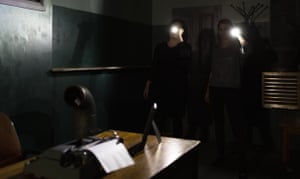‘Escape the room’ events are cropping up in cities all over the world, offering players their own Crystal Maze experience. What could be more romantic?

“Planning a date?” tweeted my friend and game designer Mink Ette in January. “What better way to find out if you’re soul mates than being trapped in a room for 60 minutes under extreme pressure?”
Mink was workshopping marketing lines for her and co-creator David Aldhouse’s new live-action room-escape game Enter the Oubliette, a dystopian-themed puzzle-solving group experience, based in a converted office building in Brixton. But to me, this sounded like an efficient way to mix business and pleasure. I needed a venue for a looming first date, I knew the guy played video games, and I figured that, whatever happens, I may at least get an article out of it. Clearly, I’m a born romantic.
The phenomenon of the live action room escape game is relatively new. The earliest examples started cropping up in Tokyo and San Francisco in the late 2000s, with many considering Takao Kato’s Real Escape Game to be the original. Nowadays, established examples like Puzzle Break in Seattle earn hundreds of thousands of dollars a year, which is probably why there are more than 2,800 permanent room escape games registered worldwide. Some take place in purpose-built venues, some pop up temporarily in disused buildings, but the format is generally the same: a group of players is locked (literally or fictionally) in a room and in order to escape within the time limit they must solve a series of physical puzzles, often designed around a specific theme.
Enter the Oubliette has a dystopian theme, influenced by the distinctly Orwellian video games Papers, Please! and Blackbar and by Richard Ayoade’s movie The Double. In the fiction, players are members of an underground resistance group fighting to free New Palagia from its totalitarian government. The room is set up to resemble an office at the Ministry of Perception with a desk, a typewriter, a switchboard, and computers that are all components of the game.

So what was I thinking? Well, there is that famous quote, wrongly attributed to Plato: “You can discover more about a person in an hour of play than in a year of conversation”. For young people today, this notion of play as a fast track to intimacy is particularly alluring; after all, millennials are famously entitled, inattentive and impatient. Frankly, the Tinder generation isn’t going to spend a year on anything, let alone conversation.
Call me cynical, but as a freelancer, taking time out of work to invest in a relative stranger is a risk. And I’m not the only one who applies cost-benefit analysis to courtship; the fellow Guardian contributor Cara Ellison called this “The Beyoncé Freelancing Method”: working out whether the guy you’re with is worth the £150 you could have been earning writing a feature.
I met Darren (not his real name but, in the spirit of internet security questions, the name of his favourite footballer when he was a kid) at a Wetherspoons in central London. My friends and I entered the pub to find it predictably rammed and rowdy, which is how we ended up sharing a table with Darren and his friend. We talked, we laughed, and at the end of the night my friend told Darren to get my number. Panicked and prejudiced (I’m sorry, Wetherspoons clientele), I told him to follow me on Twitter instead, convinced he wouldn’t even remember my name.
The first thing Darren did after proving me wrong was tell me he’d watched a talk I gave last year called “The Dating Game” in which I admitted to having no idea how to date. Good start, I thought. In that talk, I spoke about how I tended to take an academic approach to romance, so when I got the idea to invite Darren to Enter the Oubliette as a dating experiment, I figured he wouldn’t think it was such a strange thing for me to do. “How would you feel about being the subject of an article?” I asked, sending him a link to Mink’s tweet for the sake of informed consent.
“Very keen!” he said.
I questioned his keenness. “I am a horribly competitive man,” he said. This confession left me conflicted, but hey, I was already learning something about him. “You know they’re supposed to be co-operative experiences, right?”, I asked. “Of course,” he said. “And you’re all trying to beat it!” He didn’t seem at all fazed to be my test subject.
What kind of a person agrees to go to a room-escape game on a date? I decided I ought to put this question to Mink. “People that like playing, I think,” she said, “Like, if you’re going to sign up to be locked in a room for an hour then you probably are the kind of person who’s up for a dating experiment.” The character sheet so far: competitive, playful.
Darren is definitely that kind of person. “I’ve always wanted to do one,” he said when I phoned him the morning after the game, “A date, I mean.” Add ‘funny’ to the character sheet.
But seriously, I said, what did you think when I asked you out? “An Escape the Room game seemed like a lot of fun, and you seem like a lot of fun, so that was a handy venn diagram of, you know, first date.”
Apparently what stopped Darren trying an Escape the Room game before was that “getting a team of six willing to pay about £30 a head for an hour of in-fighting seems steep”. This is perhaps why he was unable to find any of his friends to go and how we ended up, probably inadvisably, in a group with several people I knew and he didn’t. Enter the Oubliette is designed for six to eight people: friends, family, colleagues, strangers, whatever. Mink has seen some interesting group dynamics in her time working on these games.
“People do come in work groups,” she said, “And those are really fascinating to watch because then there’s, like, your office work dynamic playing out in real time in front of us. It’s been really fascinating to watch some people just go in and barge other people out of the way, take charge, and then there are other teams where everyone is, like, just a well-oiled machine. The one team that has got out of our room the fastest, 16 minutes and 10 seconds left, they were definitely in the well-oiled machine category.”

Our well-oiled machine, which made it out of the room with just under 10 minutes left on the clock, included another writer Thomas McMullan, and the two of us sank with embarrassing ease into what you could charitably call leadership but would probably just describe as domination.
On the way to the pub afterwards Darren said that it was good that no one was domineering, which was kind of him but a lie nonetheless. I’ve listened back to my audio recording of the game, and I said the word “me” more than anyone else. “I took control of the hint tokens after others in the group used one too soon, sending it up the pneumatic tube before I realised what they were doing. I decided that figuring out the purpose of a censored message might have something to do with the typewriter and repeated my suggestion at increasing volume and pace until I got the attention I wanted. I raced to be the one to enter solutions that I hadn’t worked out myself. I even stole the final glory from someone who’d been working on a core puzzle for almost the entirety of the game, placing the last square of a circuit board into the grid provided rather than handing it to her as everyone else had been.
I enjoyed Enter the Oubliette so much that I forgot why I was there and came out of it convinced that it was actually Darren who’d learned a lot about me, and that he probably wouldn’t want to see me again. Naturally, I’d underestimated him again. “I guess if you’d been, like, an insane control freak then that would’ve been handy to know early on,” he said when I asked whether he thought it was a good idea for a date. “You mean you didn’t get that?” I said, only half joking.
He guessed that I’d been paying more attention to him than he was to me, which definitely should have been true but probably wasn’t. In retrospect, however, the experience did reveal a little about him, perhaps most notably how charitable he was with me. He went along with the feeble joke I made about him being the best person to figure out how to operate the speaker (so that we could get a password from our man on the inside), because he works in radio. When I retracted yet another “Me!” and said that actually he should be the one to solve a puzzle he’d started, he let me do it instead. I thought his relative quietness was because he only bothered to speak up when he had something valuable to say, a lesson I could probably do with learning, but he said he was focused on making sure everyone liked him.
While critical to our success in escaping the room, the rest of the group definitely distracted from the other goal. “I had a really really good time,” Darren said, “But I felt it was more six friends doing an escape the room game than it was two people on a hot date.” He thinks it would work if the group was all couples, and if you can find at least two other couples to go with that would definitely be an interesting experience.
Despite his misgivings, Darren still says he believes in that misattributed Plato quote. But just because you can learn about a person doesn’t mean you will; you need to be alert. Somehow, we started weighing up the potential of a board game speed dating night. Imagine a pub, with a row of tables, each offering a different game – singles could move along from one to the other, meeting someone new and playing together for a few moments. Sort of Tinder meets Buckaroo.
I asked him if thought it would work. “It would, but had the person before you been terrible at the board game, you’d come in at a disadvantage. Let’s say you went from KerPlunk to chess and the person that had been playing chess before you was just awful and he’d left, you know, your king completely unguarded and you had to come into that. How are you going to have a successful speed date when you’re too busy trying to get your rook across to defend him?”
I suggested this meant he was thinking more about the activity itself than the other aspects of the exercise – the dating part. The romance part. “You’re right,” he said, “You’re completely right, yeah. I don’t know what that says about me.” I think I can afford another hour of his company to find out for sure.
[Source:- The Gurdian]
